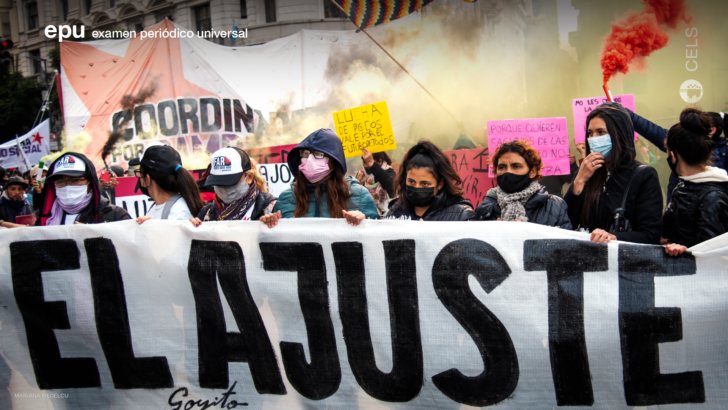The Universal Periodic Review (UPR) is an evaluation of the human rights situation around the world, carried out among the States. Created in 2006 by the United Nations General Assembly, it is the only mechanism in which, every four and half years, a country is reviewed by the other 192 UN Member States. On Monday, January 23, Argentina will be reviewed for the fourth time at a session under the auspices of the Human Rights Council, where CELS will be present.
Reviews are carried out based on the information provided by each State, the contributions from civil society organizations and the United Nations special procedures and treaty bodies. As in its last review in 2017, CELS in alliance with other organizations sent a series of thematic reports, with assessments and recommendations.
A summary per theme and access to all CELS reports produced for the review are available at this special site.
Here are some of the themes assessed and their core pillars:
Police violence and the right to protest
In Argentina, the police forces continue to show violent patterns in their actions, despite the country’s international commitments. The report informs on lethal actions, abuses and arbitrary events in police work on the streets and in situations of social protest. And, in this sense, it states that the mechanisms in place are insufficient or inadequate to control the use of police force during demonstrations, operations in vulnerable neighborhoods and evictions or raids.
Persons deprived of their liberty
Between 2007 and 2020, the national rate of incarceration grew by 55% and the penitentiary population rose by 42,487 people, an increase of 81%. In recent years, there have been numerous deaths of people held in overcrowded police jails, the majority of them due to fires in closed cells.
Declassification of intelligence archives
The report warns that the Argentine State has still not declassified or provided public access to the intelligence files produced by the security forces, the armed forces and the former State Intelligence Secretariat (SIDE) during the last military dictatorship. It is concerning that this information remains secret, making it impossible to reconstruct the role of State intelligence in the repressive circuit, and runs the risk of being destroyed.
In 2006 Law 26.160 ordered the State to undertake a survey of all Indigenous lands. However, according to the report, 16 years later only 779 of the 1,802 communities have had a complete survey. Nor is there any procedure for granting property titles pursuant to the law, or any progress on the obligation to establish a national law on Indigenous community property. Furthermore, situations of unrest and violent evictions continue to happen in Indigenous communities, with and without warrants.
Adjustment policies and foreign debt
The report shows that living conditions in Argentina have worsened in the last five years. Data that exemplifies this shows that in 2018 and 2019 unemployment rose to 10% and real salaries fell by 15% compared to 2017 levels. The poverty rate grew between 2017-2020 to over 40% of the population. In the 2017-2020 period, there were significant fluctuations in expenditures on public services. Part of this decrease is a consequence of the fiscal adjustment required by the IMF as part of the 2018 agreement signed with Argentina.
Nearly three years after the Rent Law passed, there is still no public authority responsible for implementing it and the State has not put the National Social Rent Program into operation. The protocols for protection with regard to evictions in the country are insufficient and often not met. Nor is there any system of statistics kept on who is evicted and how . Furthermore, the report states that in the City of Buenos Aires, over 7000 people are homeless and that the only policies are nighttime shelters or subsidies that are not enough to cover rent.
CELS also presented reports on the State’s role and the situation of: right to land and food, mental health, victims of involuntary or enforced disappearances, access to abortion, migrant persons and the use of technologies for crime prevention.
Following the session, the UN Member States will submit their respective recommendations for Argentina to be accountable and commit to fulfilling its international obligations in human rights matters.

